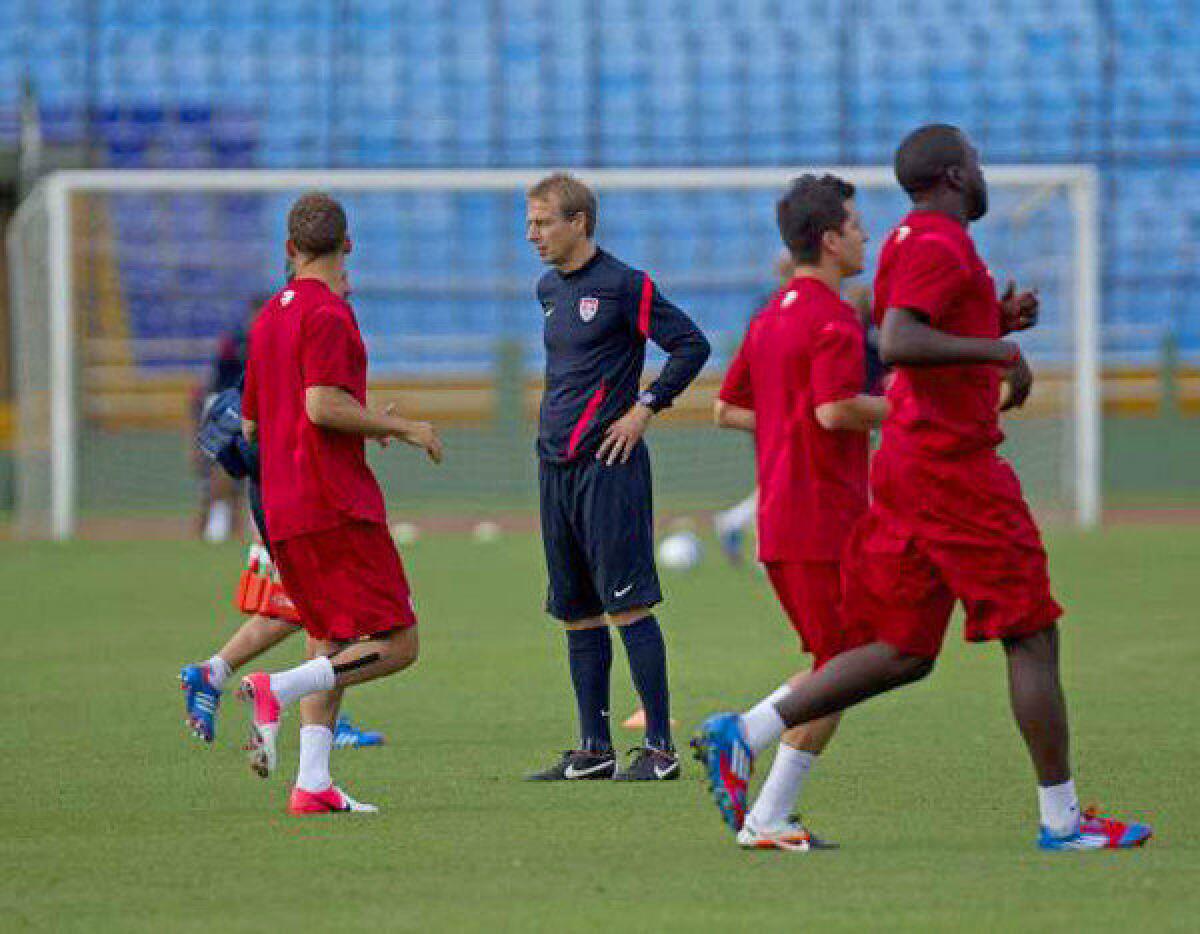Juergen Klinsmann takes it to the next level

- Share via
Spend a few minutes with Juergen Klinsmann and it’s easy to see why the coach of the U.S. national soccer team has been so successful. His excitement is infectious, his commitment unquestioned and his confidence unshakable.
Imagine Pete Carroll, only with a slightly rounder ball.
Klinsmann even finds the positives in criticism, something that chafed many of his predecessors.
“We all enjoy that because it shows that soccer is growing in the U.S. at a very fast pace,” he said this month. “There is so much interest in the game now that it’s awesome. If people discuss every roster and every individual player, to a big extent I think it’s great.
“The more people discuss it and the more opinions that are out there, I love it.”
That attitude makes Klinsmann an ideal fit for a U.S. program that remains deeper in enthusiasm than it is in talent. And it’s an approach that is partly responsible for that fact Klinsmann’s team, at 9-2-2, goes into Wednesday’s friendly with Russia in Krasnodar with a chance to finish with the best one-year winning percentage of any U.S. team in the modern era.
Among the nine wins were historic road victories over Italy and Mexico and a rout of Guatemala in a must-win finale in the third round of World Cup qualifying. Those results helped the U.S. move up five spots to 27th in the FIFA world rankings, its best mark in 17 months.
But now comes the heavy lifting. Last week’s CONCACAF draw for the final phase of World Cup qualifying left the U.S. with a challenging path to Brazil 2014, one that starts and ends on the road and forces the U.S. to play its first three games against Honduras, Costa Rica and Mexico, teams that have played in at least one of the last two World Cups.
Compare that with Mexico, clearly the class of the region after winning an Olympic gold medal last summer while rolling through its qualifying group unbeaten. El Tri not only opens the hexagonal round of qualifying at home against Jamaica, but it also had its pre-draw wish granted by avoiding a spring or fall game in the U.S., where weather could be a factor.
Naturally, Klinsmann puts a positive spin on all that.
“In a draw like that nothing is going to turn out perfect,” said Klinsmann, whose team opens qualifying Feb. 6 and plays three of its first four games outside the U.S., including a March 26 date in Mexico. “If you don’t have the first game at home you make the best out of it.
“If you get the results on the road there will be far more confidence in your home games and you can finish it off. It’s fine with me.”
To assure itself of a trip to Brazil the U.S. must finish in the top three in a six-nation field that also includes Panama. Before they can do that, though, the Americans must settle on a roster, develop an identity and perfect their style of play, tasks even the optimistic Klinsmann concedes have proven challenging.
Forty-five players saw action in the national team’s 13 games this year, the first as coach for Klinsmann, who didn’t start the same lineup twice. And while that gave him an up-close look at the talent at his disposal it did little to build the kind of chemistry the team will need going forward.
“It’s always a challenge,” said defender Carlos Bocanegra, who is playing in his third World Cup qualifying tournament under his third coach. “We all play at different clubs around the world and then we come together and we’ve got to be a team. We need to come together and become a team in three days sometimes.
“We’re still on a little bit of a transition period. … Those things are all challenges that we have to work through. But the biggest thing is just finding our chemistry and becoming a cohesive unit.”
And you can blame that for the unevenness of the U.S. offense this year, one that scored more than one goal in only four games — not exactly the aggressive, attacking style Klinsmann promised.
“It is a work in progress and a positive work in progress,” Klinsmann said. “We’ve tried to push the back line up further and further. We’ve tried to play in the opponent’s half more and more. And we try to keep the ball and rotate and play one-two touches fast.
“This is a process that will take time.”
Which isn’t something Klinsmann suddenly has little of, because come February the U.S. begins playing for keeps.
“We are confident,” he said predictably. “But we know that it’s going to be a difficult road and a one-game-at-a-time path. We are prepared for that.
“We’ve got to get it done and we’re going to get it done.”
More to Read
Go beyond the scoreboard
Get the latest on L.A.'s teams in the daily Sports Report newsletter.
You may occasionally receive promotional content from the Los Angeles Times.







